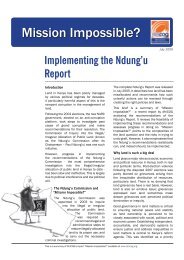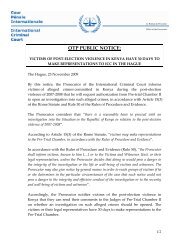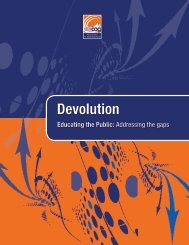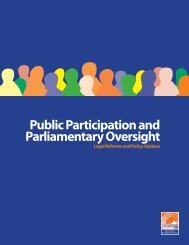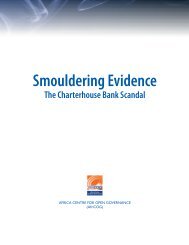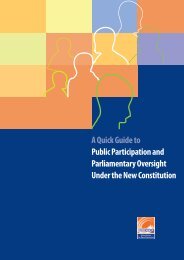Untitled - Africa Centre for Open Governance
Untitled - Africa Centre for Open Governance
Untitled - Africa Centre for Open Governance
Create successful ePaper yourself
Turn your PDF publications into a flip-book with our unique Google optimized e-Paper software.
If Parliament still fails to enact a law within the stipulated timeframe, the Chief Justice “shall advise<br />
the President to dissolve Parliament and the President shall dissolve Parliament.” 37<br />
The new Parliament <strong>for</strong>med thereafter is then required to pass the outstanding legislation within<br />
the timeframes laid out in Schedule 5. The time, however, begins to run from the date that the<br />
new Parliament commences its term. 38<br />
Despite these provisions, there have been a number of concerns raised regarding the quantity<br />
and quality of laws that have been passed since the promulgation of the constitution and of those<br />
that are yet to be passed. These concerns arise from the number of laws to be passed, the time<br />
within which they are required to be enacted and the per<strong>for</strong>mance of the key legislative elements<br />
in carrying out their legislative role.<br />
Law Making Process<br />
1. A layman’s or Raw draft Bill emanates from the line Ministry, Government<br />
Department or any Institutions mandated with the generation of Bills. The draft<br />
is then released to KLRC and AG’s office <strong>for</strong> preparation of the Bill.<br />
2. The draft Bill from the KLRC and the AGs office is released to CIC. CIC uploads the<br />
draft on its website and releases it to the widest possible range of stakeholders<br />
to allow the public to review and give feedback on how best to improve the draft<br />
Bill.<br />
3. CIC convenes a series of stakeholder consultations to seek consensus and/or fill<br />
any gaps of a constitutional nature which will not have been addressed during<br />
the Line Ministry public consultations.<br />
4. CIC then convenes the AG, KLRC, Line Ministry and any Institution involved in<br />
the generation of the Bill to a roundtable over the draft Bill to finalize the Bill by<br />
making various amendments which will have been in<strong>for</strong>med by the internal and<br />
external consultations. The CIC oversees this final development of the proposed<br />
Bill to ensure it is in line with the letter and spirit of the Constitution.<br />
5. The AG prepares the Bill and the Bill is then released to Cabinet <strong>for</strong> approval.<br />
6. Cabinet receives the proposed Bill, if need be, changes to the Bill are made and<br />
finalized be<strong>for</strong>e it is approved.<br />
7. The AG then publishes the Bill as approved by Cabinet and the Bill is then tabled<br />
in Parliament <strong>for</strong> debate.<br />
8. Parliament passes the Bill and it is taken back to the AG <strong>for</strong> preparation of the<br />
vellum copy be<strong>for</strong>e being handed over to the President <strong>for</strong> assent.<br />
9. The President assents to the Bill by signing it. Thereafter, the Attorney-General,<br />
without delay, ought to publish the new law.<br />
Source: http://cickenya.org/law-making-process<br />
37 Article 261 (7)<br />
38 Article 261 (8)<br />
17




